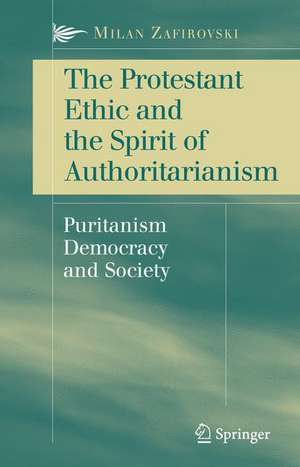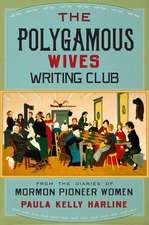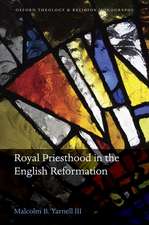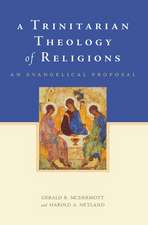The Protestant Ethic and the Spirit of Authoritarianism: Puritanism, Democracy, and Society
Autor Milan Zafirovskien Limba Engleză Hardback – 11 mai 2007
The Protestant Ethic and the Spirit of Authoritarianism: Puritanism, Democracy and Society's importance and novelty lie in its original theoretical argument and empirical demonstration that Puritanism constitutes or reproduces political-social authoritarianism rather than liberal-secular political democracy and free civil society, contrary to the conventional wisdom in Puritan societies, especially America. The book’s methodological approach is thoroughly interdisciplinary by integrating methods, theories and data in sociology with those in other social sciences such as political science, history and economics. In addition, the book uses a comparative-historical method through comparisons of Western (and other) societies at various points of history in terms of the impact of Puritanism on authoritarianism.
| Toate formatele și edițiile | Preț | Express |
|---|---|---|
| Paperback (1) | 893.05 lei 6-8 săpt. | |
| Springer – 29 oct 2010 | 893.05 lei 6-8 săpt. | |
| Hardback (1) | 648.24 lei 6-8 săpt. | |
| Springer – 11 mai 2007 | 648.24 lei 6-8 săpt. |
Preț: 648.24 lei
Preț vechi: 762.64 lei
-15% Nou
Puncte Express: 972
Preț estimativ în valută:
124.04€ • 129.86$ • 102.64£
124.04€ • 129.86$ • 102.64£
Carte tipărită la comandă
Livrare economică 05-19 aprilie
Preluare comenzi: 021 569.72.76
Specificații
ISBN-13: 9780387493206
ISBN-10: 0387493204
Pagini: 337
Ilustrații: XX, 337 p. 10 illus.
Dimensiuni: 155 x 235 x 24 mm
Greutate: 0.64 kg
Ediția:2007
Editura: Springer
Colecția Springer
Locul publicării:New York, NY, United States
ISBN-10: 0387493204
Pagini: 337
Ilustrații: XX, 337 p. 10 illus.
Dimensiuni: 155 x 235 x 24 mm
Greutate: 0.64 kg
Ediția:2007
Editura: Springer
Colecția Springer
Locul publicării:New York, NY, United States
Public țintă
Professional/practitionerCuprins
Introduction.- 1 Puritanism and Authoritarianism.- Puritanism.- The Spirit of Authoritarianism.- Puritanism and Authoritarianism: Authoritarian Mastery of the Social World.- 2. Puritanism and Political Authoritarianism: Authoritarian Mastery of Politics.- Puritan Political Authoritarianism: General Considerations.- Political Anti-Liberalism.- Political Extremism.- Anti-Egalitarianism: Inequality as Divinely Ordained Destiny.- Militarism, Nationalism and Expansionism.- 3. Puritanism and Social Authoritarianism: Authoritarian Mastery of Civil Society.- Puritan Social Authoritarianism: General Considerations.- Moral Authoritarianism.- Religious Authoritarianism.- Theocracy: The Ideal And System Of Church-State.- 4. Puritanism and Social Authoritarianism Continued.- Artistic-Cultural Authoritarianism.- Educational And Scientific Authoritarianism.- Authoritarian Anti-Humanism.- 5. Neo-Puritanism and Authoritarianism.- From Paleo- to Neo-Puritanism.- Neo-Puritanism and New Puritan Authoritarianism.- Puritanism and Contemporary Authoritarianism.- 6. Authoritarian Legacy of Puritanism in Contemporary Society.- General Puritan Authoritarian Legacy: General Considerations.- Rediscovering the Puritan Authoritarian Legacy in American Society.- Elements of the Puritan Authoritarian Legacy.- The Authoritarian Legacy of Puritanism in Global Perspective.- Great Britain versus America.
Notă biografică
Milan Zafirovski is associate professor in the Department of Sociology at the University of North Texas, USA. He holds doctoral degrees in economics and sociology. His research interests are interdisciplinary focusing on the relations between economy, politics and society. He is the author of three books: Market and Society (2003): The Duality of Structure in Markets (2002), and Exchange, Action and Social Structure (2001), as well as more than 50 articles in refereed economics and sociology journals in America, Europe and elsewhere. He is also a co-editor of the International Encyclopedia of Economic Sociology (2006) as well as an advisory/area editor in the area of Economic Sociology for the Encyclopedia of Sociology (edited by George Ritzer) (forthcoming).
Textul de pe ultima copertă
Perhaps no conventional wisdom is more common and enduring in Western societies, especially America, than that of Protestant Puritanism as the source of modern liberty and democracy. "Puritans" may have become an extinct or endangered species in the original sense by the early 21st century, but continue to be honored as both the creators and the destiny of these societies, primarily America and secondarily Great Britain. "Puritans are dead as a name, long live Puritans as a concept and legacy"--that is how Puritanism can be described in America at the threshold of the third millennium. This book critically reexamines the link of Puritanism and liberty in historical and comparative perspective. The book exposes "Puritanism and liberty" as a cherished myth or "sweet lie", suggesting that the Puritan "emperor has no cloths", in historically Protestant societies, particularly America. It shows that "Puritanism and liberty" turns out to be the exact opposite, enduringly in America and temporarily in Great Britain. If Puritanism is as American as the apple pie, then it is the "apple pie" of authoritarianism and theocracy rather than of liberty and democracy.
Caracteristici
Focuses on the political and social Puritanism in Anglo/American/Australian government Shows how supposed liberal democracies are currently and historically not so Uses a Weberian model for methodology and analysis New arguments about Puritanism's links to political and social authoritarianism rather than, as in the old arguments, with political democracy and free civil society New or retrieved (previously neglected) historical and empirical evidence documenting Puritanism's links with authoritarianism New interpretations of existing historical material about Puritanism in relation to democracy and civil society New arguments about and new interpretations of contemporary empirical material concerning Puritanism and its legacies in modern society ushering in the 21st century
















